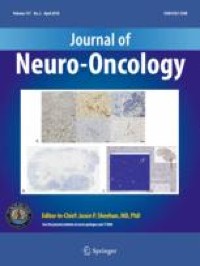Abstract
Purpose
Glioblastoma (GBM) is a highly invasive tumor. Despite advances in treatment modalities, tumor recurrence is common, seen mainly in the peritumoral brain zone (PBZ). We aimed to molecularly characterize PBZ, to understand the pathobiology of tumor recurrence.
Methods/patients
We selected eight differentially regulated genes from our previous transcriptome profiling study on tumor core and PBZ. Expression of selected genes were validated in GBM (tumor core and PBZ, n = 37) and control (n = 22) samples by real time quantitative polymerase chain reaction (qPCR). Serine protease inhibitor clade A, member 3 (SERPINA3) was selected for further functional characterization in vitro by gene knockdown approach in glioma cells. Its protein expression by immunohistochemistry (IHC) was correlated with other clinically relevant GBM markers, patient prognosis and tumor recurrence.
Results
The mRNA expression of selected genes from the microarray data validated in tumor core and PBZ and was similar to publicly available databases. SERPINA3 knock down in vitro showed decreased tumor cell proliferation, invasion, migration, transition to mesenchymal phenotype, stemness and radioresistance.
SERPINA3 protein expression was higher in PBZ compared to tumor core and also was higher in older patients, IDH wild type and recurrent tumors. Finally, its expression showed positive correlation with poor patient prognosis.
Conclusions
SERPINA3 expression contributes to aggressive GBM phenotype by regulating pro-tumorigenic actions in vitro and is associated with adverse clinical outcome.



Δεν υπάρχουν σχόλια:
Δημοσίευση σχολίου
Σημείωση: Μόνο ένα μέλος αυτού του ιστολογίου μπορεί να αναρτήσει σχόλιο.